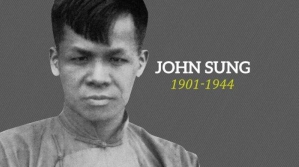
This week marks the 80th anniversary of the passing of renowned Chinese evangelist John Sung, who died in 1944 at the age of 42 due to complications from an anal fistula. Known for his unwavering faith and selfless dedication, Sung left a profound impact on China and Southeast Asia. His famous saying, "As long as my compatriots are saved, I am willing to die," highlights his deep commitment to God.
Bringing the Gospel from China to Southeast Asia
Born in Hongchi Village, Putian City, Fujian Province (1901-1944), John Sung was the son of a Methodist pastor. He became an itinerant evangelist and was actively involved in evangelistic work in China during the Japanese invasion. Sung was known for holding long Bible meetings and leading an ascetic lifestyle. His frequent clashes with other missionaries also sparked controversy.
According to G. Wright Doyle, director of the Global China Center and editor of the Biographical Dictionary of Chinese Christianity, while John Sung was not perfect, he brought hope to many who were suffering and destitute, allowing them to experience God's power and love. His influence continues to this day.
Doyle noted, "The current underground church has inherited some of the characteristics of John Sung's ministry, such as adherence to biblical teachings, fervent prayer, constant evangelism, belief in God's healing power through prayer, and a longing for Christ's return. Understanding John Sung's ministry is key to grasping the vitality of these churches." Historically, Southeast Asia has had a profound impact on the Chinese church. A century ago, Dr. John Sung left China to bring the gospel to Southeast Asia, establishing thriving churches and imparting blessings to local believers. Today, the churches in Southeast Asia look forward to returning the favor by blessing the Chinese church.
"As Long as My Compatriots Are Saved, I Am Willing to Die"
In 2021, the 120th anniversary of John Sung's birth, the Chinese Pastors Fellowship hosted an online conference themed "Remembrance, Repentance, and Revival." On the first day of the conference, Pastor Wang Tiansheng, John Sung's grandson, encouraged believers to prioritize life over knowledge in the revival movement, sharing stories of John Sung's unwavering dedication to the gospel and his fearless sacrifice. He expressed hope that the Chinese church would be filled with the Holy Spirit.
Wang Tiansheng shared his grandfather's testimony of rebirth. John Sung joined the Student Evangelistic Band on November 14, 1920, and studied at a liberal seminary in New York. Influenced by rationalism and knowledge, he began exploring Buddhism and Taoism. However, after attending an evangelistic meeting by Arthur Booth-Clibborn in 1926, his spirituality was reignited, and through the illumination of the Holy Spirit, he recognized his own sin. During a period of treatment in a mental hospital, his pride was shattered, and he resolved to devote his life to evangelism in China, declaring, "As long as my compatriots are saved, I am willing to die."
Filled with the Holy Spirit, John Sung preached the gospel with great power, revealing people's sins through the Holy Spirit's revelation, leading them to repentance and turning to God. He practiced repentance daily, believing that only by cleansing the heart of sin could the holy water enter, which was the necessary path to holiness. He read 11 chapters of the Bible every day, seeking the Holy Spirit's enlightenment after each chapter, reflecting on whether he had confronted the sin within, and viewing Bible reading as a mirror for self-examination.
Wang Tiansheng expressed his high hopes, anticipating that today's church would cultivate more preachers like John Sung, who would proclaim the message of repentance, uphold the truth of the cross, and live a life committed to it. He prayed that under the Holy Spirit's blessing, today's believers would be more empowered to turn John Sung's vision into a shared aspiration for all.






